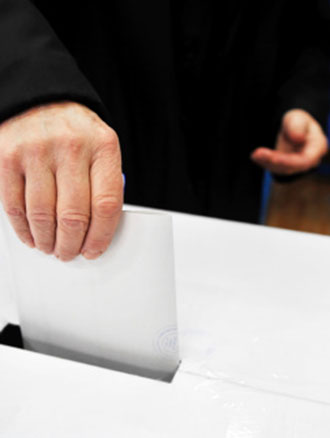October
Electoral register, not electoral fraud, the biggest problem at polling stations

Measures to tackle electoral fraud in the UK should not be introduced if they have a negative impact on the already “chronically” low voter registration and turnout, according to researchers from Newcastle University and the University of East Anglia (UEA).
Dr Toby James and
Dr Alistair Clark said the voting and registration process should not be made more difficult unless other provisions are introduced to offset any adverse effects.
Highlighting research they conducted at the May 2015 General Election, they say the main problem at polling stations was not electoral fraud, but citizens being unable to vote because they were not on the electoral register. More than two-thirds of polling stations turned at least one would-be voter away.
To tackle this problem they suggest investigating election day registration, automatic registration and allowing citizens to vote at other polling stations. The feasibility of such changes could be measured on a pilot basis initially, if necessary.
The recommendations, published today in the Political Studies Association blog, are made in evidence submitted by Dr James, from UEA’s School of Politics, Philosophy, Language and Communication Studies, and Dr Clark, from the
School of Geography, Politics and Sociology, to the government’s Review on Electoral Fraud. The review is being led by Sir Eric Pickles and was launched in August following several high-profile cases of electoral fraud, which prompted concerns about the integrity of the electoral process. It will determine whether changes are needed to make the system more secure and make recommendations by the end of the year.
Dr James and Dr Clark said existing evidence shows electoral fraud at the polling station is a localised problem, not a nation-wide one, and that even internationally the evidence does not point to it being widespread.
Dr Alistair Clark said: “While cases do exist, electoral fraud is not as widespread a problem as might be expected. Other issues also need to be dealt with.
“Firstly, the pressures that electoral administrators are under to deliver elections – often with several elections being conducted at the same time, under complex electoral laws to inevitably short deadlines – can lead to problems at the polls. This needs to be streamlined.
“Secondly, needless obstacles should not be put in the way of those eligible to vote who wish to do so. This means that new means of voting need to be considered, and these need to be properly resourced by government.”
Dr Toby James added: “Electoral fraud is not the only problem that needs to be considered when this review makes recommendations. The introduction of individual electoral registration has recently been implemented, which has tightened up opportunities for electoral fraud in the registration process. But it has long been forecast that it will lead to lower levels of electoral registration. If the transition is fast-tracked to December 2015, we may see more people being turned away in 2016’s elections.
“Unlike politicians, citizens do not think about elections and electoral registration every day of their lives. Research I have done elsewhere shows how many people think that they are already on the electoral register because they pay council tax. The polling and registration process needs to be made simple and convenient.”
Commenting on suggestions that postal voting on demand should be stopped, Dr James and Dr Clark said this could lower voter turnout, especially in local elections, as could introducing voter ID requirements.
Other recommendations they make are that the financial needs of local electoral services should be assessed and provided for, and that further resources could improve the ability of officials to investigate allegations of electoral fraud and take action. Equipping and staffing polling stations properly are also a “crucial issue” in investigating and tackling fraud, they said.
The joint UEA-Newcastle University project was funded in part by the British Academy’s Leverhulme Trust Small Research Grant.
published on: 13 October 2015
